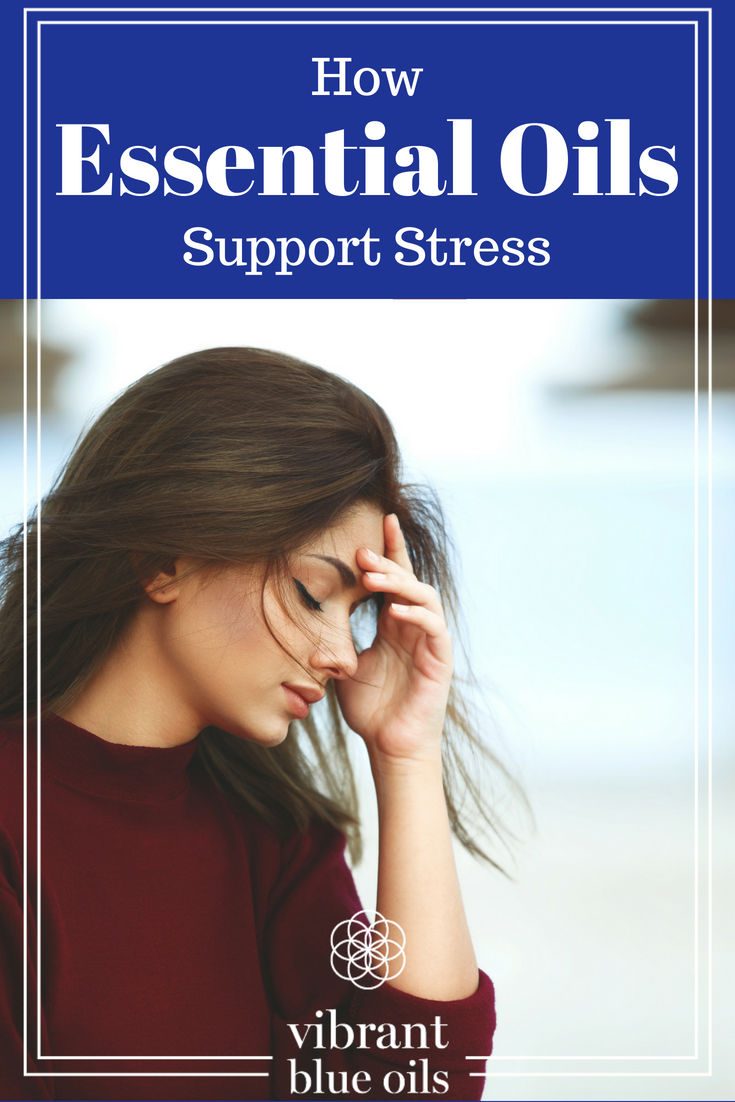We know that stress lies at that root of almost every health challenge, right?
It contributes to systemic inflammation which can impact our gut and our mood, down regulates our immune system which can contribute to auto immunity and cancer, throws our blood sugar levels out of balance and even impedes our detoxification. Read on to learn how Essential Oils support stress relief.
Essential Oils Support Stress
I don’t know about you, but when I was originally told that I needed to reduce my stress levels, I felt paralyzed.
It was clear that my job, my kids and my lifestyle were stressful, but I had no idea how to shift that stress. I wasn’t about to quit my job as I needed the money to put food on the table. As stressful as my children could be, I didn’t want to sacrifice one minute with them. I was honestly overwhelmed and paralyzed.
I was told I had to reduce my stress to improve my health, but I had no idea where to start or what to do.
So I drew on the one skill that I knew would never fail me. My ability to research. I was a journalist in a former life and a really good one. Whenever I feel overwhelmed, I approach the challenge as if I am writing an article. I get all my facts, lay them out and it helps me problem solve as I write. This is often the inspiration for my blog posts as well.
I knew that if I could clearly understand how stress works in the body, I could then map out a clear plan for reducing it that would not require drastic life changes like quitting my job or abandoning my children.
So What is Stress?
 Stress is a process in which mental (psychological), physical, natural processes of the body (physiological), environmental and/or emotional demands strain our systems and our adaptive capacity.
Stress is a process in which mental (psychological), physical, natural processes of the body (physiological), environmental and/or emotional demands strain our systems and our adaptive capacity.
We often think of stress in terms of psychological challenges, like a stressful job, relationship or situation. While those are clearly stressful to the body, they are not the only source of stress.
Physical stressors like an injury, scars, a structural misalignment or chronic inflammation can be stressful for the system. Physiological stressors could include low-level infections, sensitivities to foods like gluten or dairy, blood sugar imbalances, vitamin or mineral deficiencies, imbalances in your gut flora or a leaky gut.
Similarly, environmental stressors like mold, food additives, preservatives, pesticides, sugar, fluoride, even EMFs or chemicals in home like cleaning products or skin care.
But the most interesting, and in my opinion, not widely discussed contributor to stress is the emotional stress. The repetitive thought patterns that arise when feelings of anger, fear, grief and others are present and unresolved.
We create anticipatory stress through our thought patterns and the body cannot differentiate between actual physical stress and emotional or anticipatory stress, like thinking about a potential stressor that could occur in some imaginary future. In other word, the body mobilizes a stress-response in response to thoughts of fear, anger, grief or in response to thought patterns of guilt, jealousy, or feelings like lack of control, poor boundaries, self-abuse, shame, humiliation, unworthiness, beytrayal, shock or trauma.
How Essential Oils Can Support the Body in Stress
Understanding what actually triggers a stress response gave me the tools to help reduce it.
For example, nipping the thoughts that stir a stress response in the bud can help avoid it altogether. Essential oils are uniquely suited to help us address, transform and clear negative emotions and thought patterns.
Our sense of smell, which is part of our olfactory system, is one of the most powerful channels into the body. In fact, our sense of smell is estimated to be 10,000 times more acute than our other senses. Research has shown that scents can travel faster to the brain than other senses like sight or sound. Perhaps for that reason, inhalation can be the most direct and effective method for using essential oils. The entire process from the initial inhalation of an essential oil to a corresponding response in the body can happen in a matter of seconds.
When we inhale essential oils through the nose, the odor molecules trigger receptor sites in our mucous membrane, which then sends the odor information on to the olfactory bulb at the base of the brain. I find it interesting that it is not actually the essential oil itself that is sent to the brain, but a neural translation of the oils. These fragrance messages are interpreted and transmitted to the limbic system of the brain, known as the “emotional brain” because it deals with emotional and psychological responses.
As you may know, the limbic system serves as the control center in the brain for emotions and feelings, along with hunger, thirst and sex drive. This helps explain how scent can influence appetite and sexual attraction. It also impacts long-term memory through our hippocampus which stores our memories. The hippocampus is the area of the brain at play during those powerful experiences of smell triggering emotions or memories. For me, the mere smell of mothballs transports me back in time to my grandparent’s apartment in Brooklyn, triggering a multi-sensory memory including both the visuals and the emotions that I experienced during our annual visits.
This powerful emotional reaction in the limbic system is triggered by nerve impulses which in turn trigger other areas of the brain that are responsible for secreting hormones, neurotransmitters and regulating body functions. For example, the pituitary gland releases endorphins, which can help alleviate pain and promote a sense of well-being.
The theory of how this works centers on the idea that essential oils can stimulate or sedate the brain to promote or inhibit the production and release of various neurotransmitters which then impact the nervous system.
Because smells can bypass the thought center of the thalamus and connect directly to the emotional center of the brain, known as the amygdala in the limbic system, they can trigger us to react first and think later. All other physical senses are routed through the thalamus, which acts as the switchboard for the brain, passing stimuli onto the cerebral cortex (the conscious thought center) and other parts of the brain.
The amygdala plays a major role in storing and releasing emotional trauma. The easiest way to stimulate this gland is through the sense of smell. In other words – the emotional brain responds better to smell than it does to words that are read, spoken or heard. Our sense of smell links directly to emotional states and behaviors often stored since childhood.
This makes essential oils especially powerful tools for enabling us to access stored or forgotten memories and suppressed emotions, like anxiety, depression, fear, worry, grief, trauma, anger and self-abuse. Once accessed, we can acknowledge and release them. The word “emotion” includes the word motion, implying that are supposed to move through us and be released. Negative emotions can that we hold onto can contribute to health problems.
As you may recall, emotions and thought patterns can trigger an ongoing stress response in the body (since our stress response cannot differentiate between physical or emotional and thought driven stressors) which impedes our ability to heal. Smelling essential oils can be a powerful tool for moving through and releasing these thought patterns. To learn more about different essential oil blends to help release emotions, click here.
Essential Oils as Tools to Relieve Stress
Armed with this knowledge that I could use essential oils to help balance my stress, and not need to abandon my job or my children, I incorporated several emotional blends (my personal favorites are Liver Support™ for my anger and Small Intestine Support™ for my boundaries), along with:
Parasympathetic®: The first line of defense against stress is known as the “fight or flight” response triggered by the sympathetic nervous system. We are designed to switch into this sympathetic state, flee from danger, then drop back into the balanced parasympathetic “rest and digest” state where we can rest, repair and heal. To help stimulate the Parasympathetic response, apply Vibrant Blue Oils Parasympathetic® blend to the vagal nerve (behind the earlobe on the mastoid bone). For more aggressive vagal stimulation, you can also apply at the base of the skull (where you feel a small indent). Apply before meals to optimize digestion and up to 6 times daily to help reset the body into the Parasympathetic state.
Adrenal®: The adrenal glands help determine and regulate the body’s stress response by secreting hormones like adrenaline and cortisol. Prolonged periods of stress can deplete our reserves of these hormones and exhaust the adrenal glands. Applying Vibrant Blue Oils Adrenal® blend over the adrenal glands (back of the body, one fist up from the 12th rib), may help to increase the body’s ability to adapt to stress and maintain healthy adrenal function.
Hypothalamus™: The limbic lobe can also directly activate the hypothalamus – a pearl size region of the brain often referred to as the “master gland” which acts as the hormonal control center for neural and hormonal messages received from/sent to body and plays a key role in the body’s stress response. The hypothalamus releases hormones that can affect everything from sex drive to energy levels. The production of growth hormones, sex hormones, thyroid hormones, and neurotransmitters such as serotonin, are all governed by the hypothalamus. It is constantly reading blood the levels of hormones, and adjusting resulting signals sent to the body to maintain internal balance (homeostasis). Chronic and prolonged stress can damage the hypothalamus’s ability to receive clear messages from the body which then impacts all outgoing endocrine and neural signals. Applying Vibrant Blue Oils Hypothalamus™ blend over the third eye may help reset the natural ability of the hypothalamus to send and receive clear messages to and from the body.
I hope this post makes the task of managing stress more manageable. Please feel free to share your favorite stress management tips in the comments below.
Resources
Ready to get started? Click the links below to order today:
- Adrenal® available here
- Hypothalamus™ available here
- Liver Support™ available here
- Parasympathetic® available here
- Small Intestine Support™ available here




